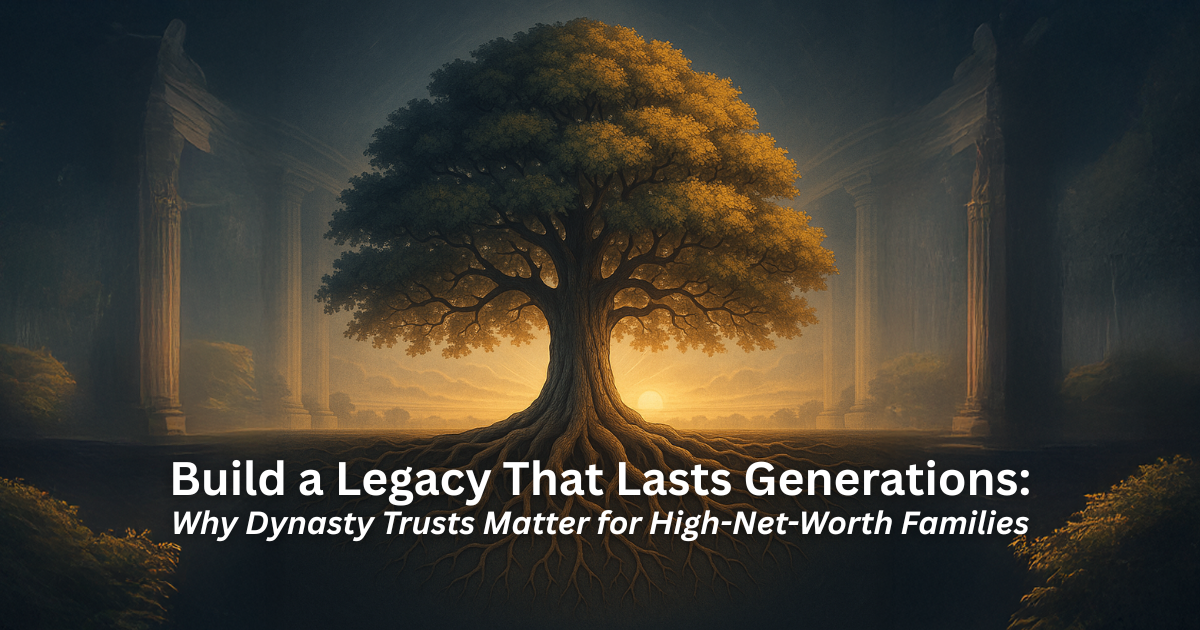
Dynasty Trusts in North Carolina: How to Protect Family Wealth for Generations
Why Dynasty Trusts Matter for High-Net-Worth Families
Wealth is more than a balance sheet. It represents the sacrifices, opportunities, and values of those who came before—and a chance to give future generations a stronger foundation. For North Carolina families with significant assets, preserving that wealth across generations takes more than a will or even a typical revocable living trust.
Enter the dynasty trust: a long-term legal structure that allows families to grow, preserve, and transfer wealth with remarkable efficiency. It’s a powerful strategy for those looking to minimize estate and GST tax, guard against financial missteps or divorces, and support children and grandchildren with purpose—not just lump sums.
Thanks to favorable North Carolina law—specifically, the repeal of the Rule Against Perpetuities in 2007—these trusts can now exist indefinitely, giving families the ability to design legacy plans that endure for centuries. At the same time, federal tax law currently allows individuals to shelter nearly $13.9 million from transfer taxes, an opportunity that will be cut in half come 2026 unless Congress acts.
For high-net-worth families serious about creating a multigenerational legacy, dynasty trusts are not just an option—they’re the cornerstone.
What Is a Dynasty Trust?
A dynasty trust is an irrevocable trust designed to hold and protect family wealth for multiple generations, often in perpetuity. Unlike most estate planning vehicles, which distribute assets within one or two generations, a dynasty trust keeps wealth within a protected structure, avoiding estate tax at each generational transfer.
When properly designed, a dynasty trust:
- Avoids estate tax and generation-skipping transfer (GST) tax for as long as the trust holds assets.
- Protects beneficiaries from creditors, divorces, lawsuits, and poor decision-making.
- Encourages long-term financial stewardship by offering structured support for education, housing, entrepreneurship, or other family goals.
Federal GST Exemption: Locking in Generational Wealth
At the federal level, one of the main benefits of a dynasty trust is the ability to use the GST exemption. This exemption allows transfers to grandchildren and later generations to be made free of the 40% GST tax. When allocated to a properly designed trust, the exemption also shelters future appreciation of those assets—potentially saving millions in tax over time.
North Carolina’s Favorable Legal Environment
Historically, the Rule Against Perpetuities limited how long a trust could last. But in 2007, North Carolina repealed its version of this rule (via N.C. Gen. Stat. § 41-23). As long as the trust does not create an unreasonable restraint on alienation, it can now continue indefinitely. This unique legal flexibility makes North Carolina an ideal jurisdiction for dynasty trust planning.
Who Should Consider a Dynasty Trust?
Dynasty trusts are not only for billionaires. Any family whose estate may exceed the estate tax exemption threshold—expected to fall to $7 million per person in 2026—should seriously consider this tool.
Ideal Candidates:
- Families with net worths of $10M+ (including life insurance death benefits)
- Owners of appreciating assets: real estate, private equity, concentrated stock positions
- Entrepreneurs passing down family businesses or family LLCs
- Grandparents funding education or home down payments for descendants
- Individuals looking to protect legacy assets from divorce or liability claims
Even if your estate is below the current threshold, consider future appreciation. A $6M real estate portfolio today could easily double within 20 years. Dynasty trusts allow you to lock in the current exemption before it sunsets.
Business Succession and Family Governance
Dynasty trusts shine in succession planning. If structured correctly, they can own shares in family businesses or interests in family LLCs, allowing centralized governance across generations. Rather than splitting ownership among heirs, a single trust holds the asset while trustees manage oversight, ensuring smoother transitions and fewer family disputes.
Key Tax Advantages of Dynasty Trusts
Tax efficiency is at the heart of dynasty trust planning. The benefits fall into three main categories:
1. Federal Estate Tax Shelter
Assets contributed to the trust are removed from the grantor’s taxable estate. When funded before the 2026 exemption drop, the trust locks in the current $13.9M exemption per individual ($27.8M for married couples). The full amount, plus future appreciation, passes tax-free.
2. GST Tax Exemption = Perpetual Tax Savings
By allocating GST exemption, the trust avoids the 40% tax on transfers to grandchildren or great-grandchildren. Once allocated, this exemption permanently shelters future distributions and growth within the trust.
3. Grantor vs. Non-Grantor Trust Structures
- Grantor Trusts: The grantor continues to pay the trust’s income tax, allowing the trust to grow tax-free. This “tax burn” strategy further reduces the grantor’s estate.
- Non-Grantor Trusts: The trust pays its own taxes, often at compressed brackets. In some cases, the trust can be sited in a no-income-tax state (like Delaware or Nevada) to avoid state tax altogether.
The right choice depends on your long-term goals, residency, and investment strategy.
Non-Tax Benefits: Control, Protection, and Stewardship
While taxes often drive interest, the non-tax advantages are just as critical:
1. Creditor and Divorce Protection
Assets in a properly drafted trust are not part of the beneficiary’s personal estate. This protects them from lawsuits, bankruptcies, or ex-spouses in the event of divorce.
2. Spendthrift Provisions
Dynasty trusts often include clauses that prevent beneficiaries from assigning or pledging trust interests. Distributions can be tied to age, needs, or specific goals, such as:
- College or graduate education
- First home purchases
- Starting a business
- Matching earned income
These structures provide support without encouraging dependency.
3. Long-Term Flexibility
Future generations can appoint or remove trustees, add trust protectors, or modify certain administrative terms through decanting or trust modification statutes (with proper safeguards). That ensures the trust can evolve without compromising its purpose.
North Carolina-Specific Considerations
North Carolina is uniquely favorable for dynasty trusts. In addition to repealing the Rule Against Perpetuities in 2007, the state offers:
No State Estate or Inheritance Tax
Unlike some states, North Carolina does not impose estate or inheritance taxes. This allows families to focus solely on federal tax planning.
Trust Duration Flexibility
With the common law rule repealed, trusts can now be structured to last indefinitely—so long as there’s no restriction on the beneficiary’s ability to sell or otherwise transfer their interest. This supports true multigenerational planning.
Trustee and Situs Options
Trusts governed by North Carolina law can name institutional or individual trustees in-state or elsewhere. Trustees can be replaced by trust protectors, offering adaptability as family and financial circumstances change.
Common Mistakes to Avoid
1. Failing to File IRS Form 709
Any gift over the annual exclusion (currently $17,000) must be reported using Form 709. This includes funding a dynasty trust. Omitting the form can lead to IRS scrutiny or denial of GST exemption allocation.
2. Improper GST Allocation
Failing to properly allocate the GST exemption when transferring assets into the trust can result in future distributions being taxed at 40%. This is a one-time opportunity to shield future growth, so it must be done correctly.
3. Incomplete or Incorrect Funding
All intended assets must be correctly retitled into the trust or its associated entities. Common oversights include leaving real estate deeds or LLC memberships outside the trust.
4. Outdated Trustee Provisions
Trustees have a long-term role. Appointing family members without succession planning or corporate trustee backup can create problems if the trustee becomes incapacitated or conflicted.
5. Ignoring Evolving Tax Law
What works today may not work in 10 years. Dynasty trusts should include flexible provisions to respond to future tax law changes—through trust decanting, trust protectors, or amendment powers.
Advanced Strategies for Enhancing Dynasty Trusts
1. SLATs (Spousal Lifetime Access Trusts)
A SLAT allows one spouse to gift assets to an irrevocable trust for the benefit of the other. It removes assets from the estate while preserving indirect access through the beneficiary spouse. SLATs pair well with dynasty trusts and help “lock in” the exemption.
2. Family LLCs or FLPs
Holding assets like real estate or investments through a Family LLC can reduce taxable value through valuation discounts. It also streamlines control, allowing the trust to own centralized interests without dividing assets among heirs.
3. Charitable Remainder Trusts (CRTs)
A CRT allows families to sell appreciated assets tax-deferred, distribute income to beneficiaries, and eventually benefit a charity. Pairing CRTs with dynasty trusts can support both philanthropic goals and tax efficiency.
Is a Dynasty Trust Right for Your Family?
If you’re aiming to:
- Preserve wealth for multiple generations
- Avoid estate and GST taxes
- Support education or entrepreneurship without handing over lump sums
- Shield assets from creditors or divorces
- Lock in 2025 exemption levels before they drop
…then a dynasty trust may be the ideal fit.
Ask yourself:
- What will your estate be worth in 20–30 years?
- Do you want to provide guidance, not just inheritance?
- Are you worried about future taxes, lawsuits, or remarriages?
Dynasty trusts provide the structure and foresight to address all of these concerns.
Action Plan: What to Do Next?
Establishing a dynasty trust requires more than just filling out forms—it demands a coordinated strategy to protect family wealth for generations through careful planning and execution. If your estate may exceed $7 million (individual) or $14 million (married) in the coming years, taking action before the 2026 sunset of the current GST tax exemption is essential.
Step 1: Assemble Your Advisory Team
Work with a seasoned North Carolina estate planning attorney who understands multigenerational trusts, as well as a CPA and financial advisor who can model long-term scenarios and cash flow projections.
Step 2: Evaluate Your Current Estate Exposure
Identify what’s in your gross estate, including life insurance death benefits, business interests, retirement accounts, and real estate. Consider how future growth could push you above exemption thresholds.
Step 3: Run Projections on GST Allocation
Estimate how much of your GST exemption you should allocate now and whether you should combine it with a SLAT, Family LLC, or charitable component. The IRS Unified Credit Table can help benchmark exemption values.
Step 4: Choose the Right Trustee Structure
Select an independent trustee or create a mechanism for rotating trustees across generations. This keeps the trust from becoming stale or misaligned with your family’s evolving needs.
Step 5: Draft and Fund the Trust
Properly fund the trust with assets that are expected to grow—such as securities, real estate, or business interests—and file Form 709 to report and allocate your GST exemption.
The opportunity to lock in today’s high exemption levels will not last. Acting now ensures your legacy is directed by your values—not dictated by tax law.
Protecting Your Family’s Legacy Shouldn’t Wait
Every year that passes without a plan is a year that puts your legacy at risk. Without the right structure, your hard-earned wealth could be chipped away by taxes, lawsuits, second marriages, or simply mismanagement by future generations. The looming reduction of the estate and GST tax exemptions in 2026 only adds urgency—once those limits are cut in half, the opportunity to protect millions in family assets may vanish.
For families who have built something worth preserving, the worst mistake is assuming there’s still time. North Carolina estate planning laws make it possible to build a multi-century legacy right now—but that window is narrowing. The longer you wait, the fewer tools you’ll have available, and the more your family may pay down the line.
Let’s take the guesswork out of your legacy. Schedule a complimentary call today to explore whether a dynasty trust or similar structure is the right fit. There’s no pressure—just thoughtful guidance, rooted in experience, so your family is never left starting from scratch.

